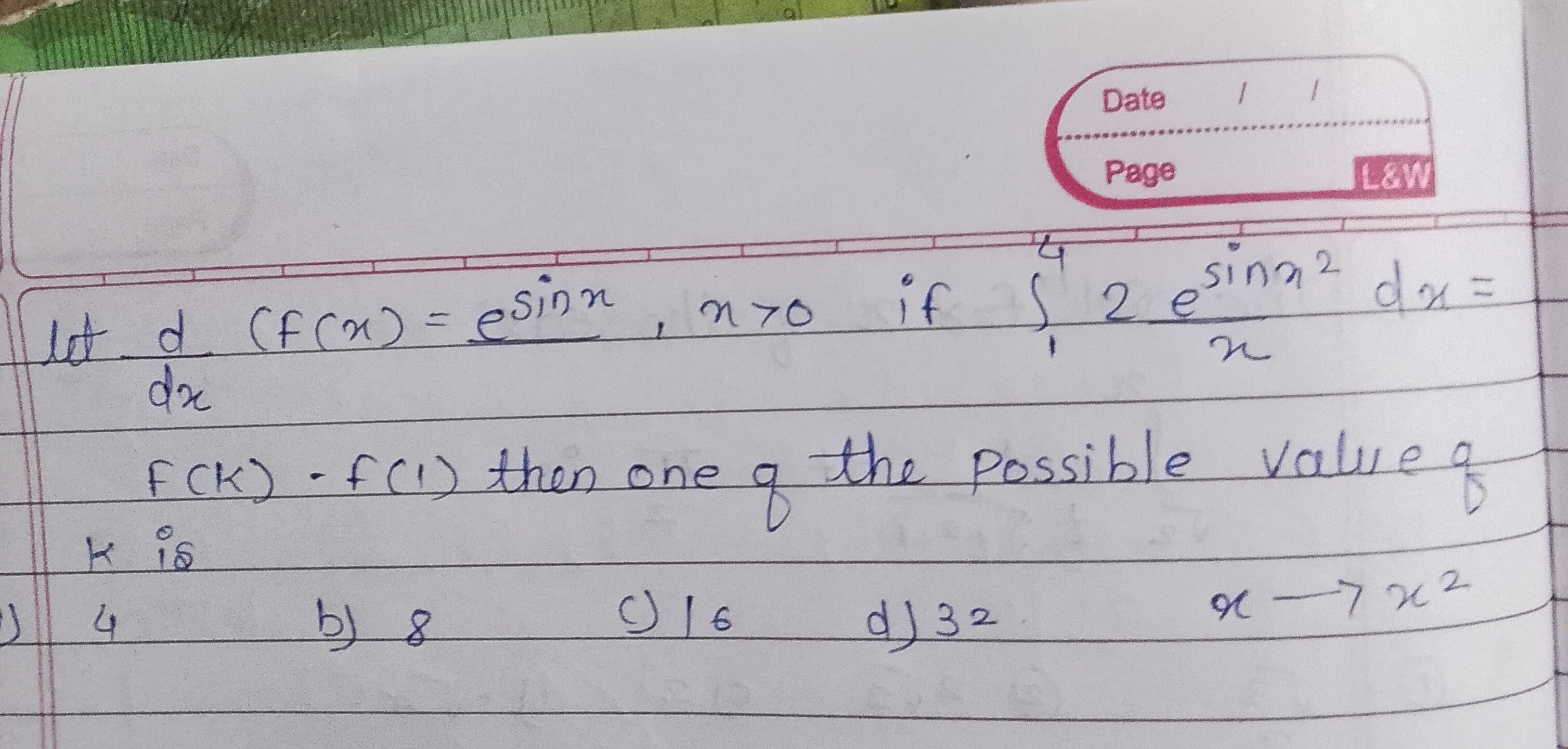Question
Question: Let $\frac{d}{dx}(f(x))=e^{sinx}, x>0$ if $\int_{1}^{4} 2 \frac{e^{sinx^2}}{x}dx=$ $F(K)-f(1)$ then ...
Let dxd(f(x))=esinx,x>0 if ∫142xesinx2dx= F(K)−f(1) then one of the possible value of K is

4
8
16
32 x→x2
16
Solution
The problem asks us to find a possible value of K given the derivative of a function f(x) and an equality involving a definite integral.
The given information is:
d/dx(f(x)) = e^(sin x), forx > 0.∫_{1}^{4} 2 \frac{e^{sinx^2}}{x}dx = F(K)-f(1).
There appears to be a slight inconsistency in the problem statement when compared to standard calculus problems of this type, especially in light of the provided "similar question".
If d/dx(f(x)) = e^(sin x), then f(x) is an antiderivative of e^(sin x).
Let's evaluate the given integral I = ∫_{1}^{4} 2 \frac{e^{sinx^2}}{x}dx.
To simplify this integral, we use the substitution method.
Let u = x^2.
Then, differentiate u with respect to x: du/dx = 2x.
So, du = 2x dx.
Now, we need to rewrite the integrand in terms of u and du.
The integrand is 2 * e^(sin(x^2)) / x.
We can rewrite 2/x as (2x) / x^2.
So, the integrand becomes (2x / x^2) * e^(sin(x^2)).
This can be further written as (1 / x^2) * e^(sin(x^2)) * (2x dx).
Now, substitute u = x^2 and du = 2x dx:
The term x^2 in the denominator becomes u.
The term e^(sin(x^2)) becomes e^(sin u).
The term 2x dx becomes du.
Next, change the limits of integration according to the substitution:
When x = 1, u = 1^2 = 1.
When x = 4, u = 4^2 = 16.
So, the integral I transforms to:
I = ∫_{1}^{16} \frac{1}{u} e^{sin u} du
Now, let's look at the given d/dx(f(x)) = e^(sin x).
If this is strictly followed, then f'(u) = e^(sin u).
However, the integral we obtained is ∫_{1}^{16} \frac{e^{sin u}}{u} du. This integral's integrand is e^(sin u) / u, which is not f'(u). This means the problem statement as written leads to an inconsistency or a much more complex problem than usually intended for these exams.
Comparing with the "similar question" provided, which has d/dx F(x) = e^(sin x)/x, it is highly probable that the given question has a typo and was intended to be d/dx(f(x)) = e^(sin x) / x. Let's proceed with this assumption, as it makes the problem solvable and consistent.
Assumption: Let d/dx(f(x)) = e^(sin x) / x.
This means f'(x) = e^(sin x) / x.
Under this assumption, the integrand (e^(sin u) / u) is exactly f'(u).
By the Fundamental Theorem of Calculus, ∫_{1}^{16} f'(u) du = f(16) - f(1).
The problem states that ∫_{1}^{4} 2 \frac{e^{sinx^2}}{x}dx = F(K)-f(1).
Assuming F(K) refers to f(K) (as f(1) is used), we have:
f(16) - f(1) = f(K) - f(1)
Comparing both sides, we can conclude that f(16) = f(K).
Since f'(x) = e^(sin x) / x and for x > 0, e^(sin x) is always positive and x is positive, f'(x) is always positive. This means f(x) is a strictly increasing function. Therefore, if f(16) = f(K), then K must be 16.
The final answer is 16.
Explanation of the solution:
- Identify the derivative: Assume the intended derivative is
f'(x) = e^(sin x) / xbased on common problem patterns and the provided similar question. - Transform the integral: Use the substitution
u = x^2. This impliesdu = 2x dx. - Adjust integrand and limits: Rewrite the integral
∫_{1}^{4} 2 \frac{e^{sinx^2}}{x}dxas∫_{1}^{4} \frac{e^{sinx^2}}{x^2} (2x dx). - Substitute: Replace
x^2withuand2x dxwithdu. Change limits fromx=1tou=1, andx=4tou=16. The integral becomes∫_{1}^{16} \frac{e^{sin u}}{u} du. - Apply Fundamental Theorem of Calculus: Since
f'(u) = e^(sin u) / u, the integral evaluates to[f(u)]_{1}^{16} = f(16) - f(1). - Compare and solve for K: Equate this result with the given expression
f(K) - f(1). This yieldsf(16) - f(1) = f(K) - f(1), which simplifies tof(16) = f(K). Sincef'(x) > 0forx > 0,f(x)is strictly increasing, implyingK = 16.
